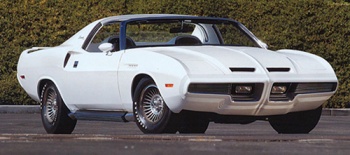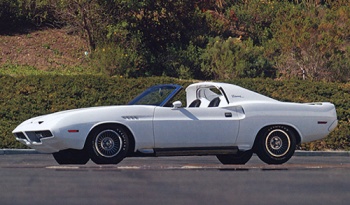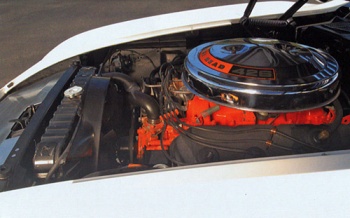Difference between revisions of "1970 Dodge Diamante (Show Car)"
| Line 14: | Line 14: | ||
Weeks after its show car debut, the Yellow Jacket's [[candied]] orange paint started showing it's defects, and the silver [[basecoat]] was showing through in many areas. Since the car was so similar looking to the 70 Challenger now in showrooms and on the streets all over the US, and it being less than overwhelming on the show circuit -- the [[Chrysler Corporation]] opted to not repaint the car, but to instead use it to create a new show car called the "Diamante", which stands for diamond in Spanish. | Weeks after its show car debut, the Yellow Jacket's [[candied]] orange paint started showing it's defects, and the silver [[basecoat]] was showing through in many areas. Since the car was so similar looking to the 70 Challenger now in showrooms and on the streets all over the US, and it being less than overwhelming on the show circuit -- the [[Chrysler Corporation]] opted to not repaint the car, but to instead use it to create a new show car called the "Diamante", which stands for diamond in Spanish. | ||
| + | |||
| + | [[Image:Diamante3.jpg|thumb|right|350px|Diamante in its Current Restored Glory]] | ||
Syntex, Inc. also performed this conversion using wider front fenders, a sloping hood replacing the shaker, and a pointed nose that was a throwback to the 1969 Dodge [[Daytona]] and 1970 [[Plymouth]] [[Superbird]]. The low hood and pointed nose required shortening the radiator; and the wider fenders required converting the power brakes to manual. The paint was white that shimmered, rumored to be because of crushed diamonds mixed in it. In reality the paint was a heavy Pearl White that [[Chrysler]] first called [[Jewel White]], but later renamed [[Quasar Pearl White]]. The car was finishe just in time for the 1971 Detroit Auto Show. | Syntex, Inc. also performed this conversion using wider front fenders, a sloping hood replacing the shaker, and a pointed nose that was a throwback to the 1969 Dodge [[Daytona]] and 1970 [[Plymouth]] [[Superbird]]. The low hood and pointed nose required shortening the radiator; and the wider fenders required converting the power brakes to manual. The paint was white that shimmered, rumored to be because of crushed diamonds mixed in it. In reality the paint was a heavy Pearl White that [[Chrysler]] first called [[Jewel White]], but later renamed [[Quasar Pearl White]]. The car was finishe just in time for the 1971 Detroit Auto Show. | ||
Revision as of 22:07, 12 May 2012
Background
Mopar Action Magazine calls the Diamante Show Car the "Most Valuable Mopar on the Planet" in their August 2012 (Volume 19 Number 5) issue. Most of the information in this Wiki was gleaned from that magazine article. It began life as a Dodge Challenger, the first Hemi E-Body ever built. It was the most highly optioned Challenger ever built, and originally a triple black 4-speed convertible.
History
On the first day of production of the Mopar E-Body, the most highly optioned Hemi was painted black, given the VIN of JS27ROB100022, and then pulled of the line to become a show car. It was a 4.10 Dana car with power windows and adding to its firsts -- it was the first production Mopar with a Shaker Hood. However, it wasn't originally built as the Diamante.
The Challenger was sent to Syntex, Inc. in Dearborn where it was made into a mildly customized 2-seater and painted orange. It was given the name Yellow Jacket. Its purpose was to test the possibility of producing a car to compete with the Chevrolet Corvette. It borrowed heavily from the earlier concept car Duster1, which was a Targa style 2-seater built on a 383 Plymouth Road Runner.
Weeks after its show car debut, the Yellow Jacket's candied orange paint started showing it's defects, and the silver basecoat was showing through in many areas. Since the car was so similar looking to the 70 Challenger now in showrooms and on the streets all over the US, and it being less than overwhelming on the show circuit -- the Chrysler Corporation opted to not repaint the car, but to instead use it to create a new show car called the "Diamante", which stands for diamond in Spanish.
Syntex, Inc. also performed this conversion using wider front fenders, a sloping hood replacing the shaker, and a pointed nose that was a throwback to the 1969 Dodge Daytona and 1970 Plymouth Superbird. The low hood and pointed nose required shortening the radiator; and the wider fenders required converting the power brakes to manual. The paint was white that shimmered, rumored to be because of crushed diamonds mixed in it. In reality the paint was a heavy Pearl White that Chrysler first called Jewel White, but later renamed Quasar Pearl White. The car was finishe just in time for the 1971 Detroit Auto Show.
The car was popular with the show circuit through 1974, when it acquired a bad scratch in the paint during transporting. The was sent George Busti of Creative Customs in Detroit for a repaint. Problem was that George was not given the specific instructions to repaint white, and as he hated white, he repainted it a Candied Tangerine Orange. When the car was sent back, Dodge freaked out as there is no such thing as a Orange Diamond. As this was the last year for the E-Body, Dodge just put the car (showing 600 miles on the odometer) in storage.
A few years later Chrysler is on the verge of bankruptcy, and the storage company wanted their money for the cars they were storing. Chrysler told them to go ahead and sell the cars -- and the Diamante was auctioned off. The first buyer was a collector Leo Gephardt. He soon flipped it to another collector at auction, and that buyer sold it to famous Dream Car collector Joe Bortz for $75,000. Bortz showed it for a couple of years and that's when it appears to have had the misinformation passed along that that car had been shown 71-74 as an orange car. It appears that Bortz never researched the car or look at the VIN to realize what a valuable car he had, and since it didn't really fit in with his collection of 50s Finned Dream Cars, he sold it to Steve Juliano -- who still owns the car today.
Juliano did research the car's history, and verified it by looking at the layers of paint under the wiper trim to fine white, then orange, then black. The car had the white layer of paint matched and has since been restored to its original White Diamond beauty.
The interior as both the Yellow Jacket and the Diamante was always been stock with the exception of a fiberglass Toneau cover surrounding the seat backs of the front seats. The 4-gang power window switch operates the two front windows, the rear Targa window, and the rear wing.
Related Models
- Dodge Yellow Jacket
- 1970-1974 Dodge Challenger
Magazine Reference
- Mopar Action Magazine August 2012 (Volume 19 Number 5) issue.


